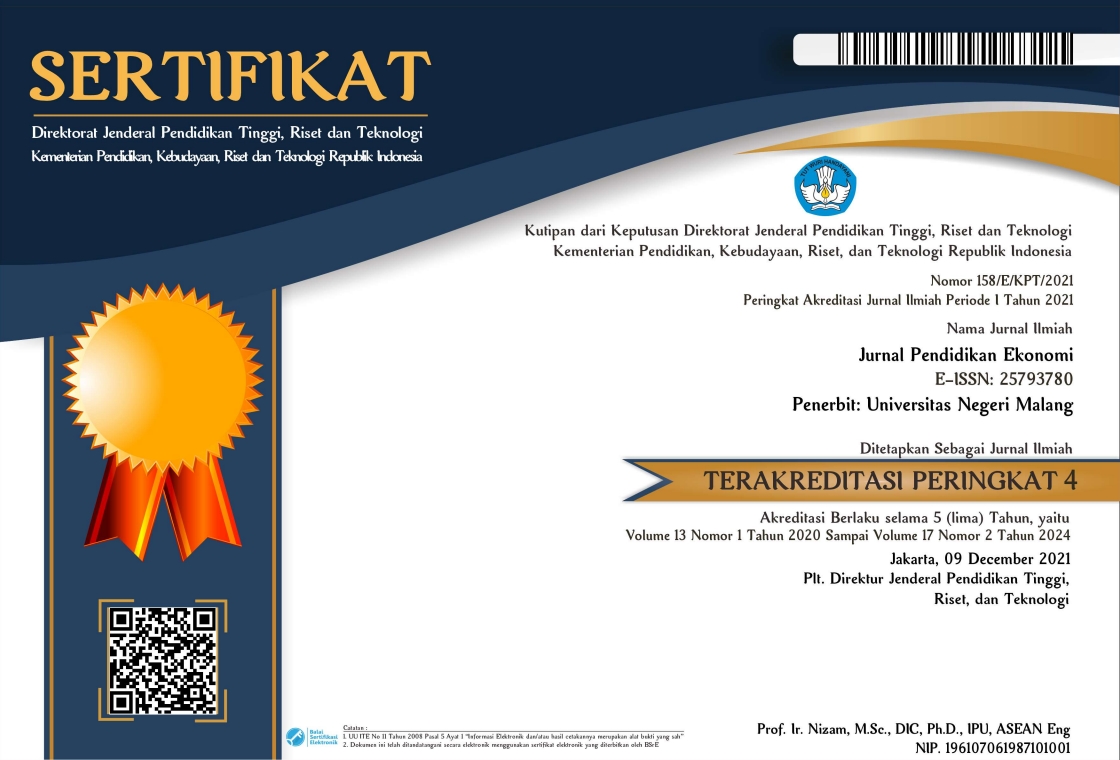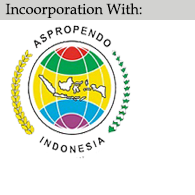Pengembangan Prototype Model Pembelajaran Pengelolaan Bisnis Start Up Untuk Meningkatkan Kreativitas Mahasiswa
Abstract
The Startup Business Management course is one of the courses taught in the Commerce Education study program, State University of Malang, which is included in the Specialization and Self-Development Courses (SSDC) group and is a transdisciplinary subject. This course allows students of all majors to follow the learning process. It is important to develop a learning model that can accommodate the characteristics of this course. This research is a development research. The resulting product is a learning model syntax prototype in the Start Up Business Management course. The development design that will be used in this study is the ADDIE development design. The ADDIE model stands for Analysis, Design, Development or Production, Implementation or Delivery, and Evaluation. The development results show that the START-UP model has been successfully developed with its own originality and is considered valid by the validator. The conclusion of this research is that the research results can be used in the next process, namely empirical testing and implementation in learning.
Keywords
Full Text:
PDFReferences
Arcidiacono, G., Yang, K., Trewn, J., & Bucciarelli, L. (2016). Application of Axiomatic Design for Project-based Learning Methodology. Procedia CIRP, 53, 166–172. https://doi.org/10.1016/j.procir.2016.08.003
Barak, M., & Yuan, S. (2021). A cultural perspective to project-based learning and the cultivation of innovative thinking. Thinking Skills and Creativity, 39(September 2020), 100766. https://doi.org/10.1016/j.tsc.2020.100766
Ciftci, S. (2015). The Effects of Using Project-Based Learning in Social Studies Education to Students’ Attitudes towards Social Studies Courses. Procedia - Social and Behavioral Sciences, 186, 1019–1024. https://doi.org/10.1016/j.sbspro.2015.04.205
Efstratia, D. (2014). Experiential Education through Project Based Learning. Procedia - Social and Behavioral Sciences, 152, 1256–1260. https://doi.org/10.1016/j.sbspro.2014.09.362
Elfeky, A. I. M., Masadeh, T. S. Y., & Elbyaly, M. Y. H. (2020). Advance organizers in flipped classroom via e-learning management system and the promotion of integrated science process skills. Thinking Skills and Creativity, 35(November 2019), 100622. https://doi.org/10.1016/j.tsc.2019.100622
Gomez-del Rio, T., & Rodriguez, J. (2022). Design and assessment of a project-based learning in a laboratory for integrating knowledge and improving engineering design skills. Education for Chemical Engineers, 40(February), 17–28. https://doi.org/10.1016/j.ece.2022.04.002
Guo, P., Saab, N., Post, L. S., & Admiraal, W. (2020). A review of project-based learning in higher education: Student outcomes and measures. International Journal of Educational Research, 102(May), 101586. https://doi.org/10.1016/j.ijer.2020.101586
Hernáiz-Pérez, M., Álvarez-Hornos, J., Badia, J. D., Giménez, J. B., Robles, Á., Ruano, V., & San-Valero, P. (2021). Contextualized project-based learning for training chemical engineers in graphic expression. Education for Chemical Engineers, 34, 57–67. https://doi.org/10.1016/j.ece.2020.11.003
Hinrichsen, J., & Coombs, A. (2013). The five resources of critical digital literacy: A framework for curriculum integration. Research in Learning Technology, 21, 1–16. https://doi.org/http://dx.doi.org/10.3402/rlt.v21.21334
Huang, Y. M., Silitonga, L. M., & Wu, T. T. (2022). Applying a business simulation game in a flipped classroom to enhance engagement, learning achievement, and higher-order thinking skills. Computers and Education, 183(June 2021), 104494. https://doi.org/10.1016/j.compedu.2022.104494
Kettanun, C. (2015). Project-based Learning and Its Validity in a Thai EFL Classroom. Procedia - Social and Behavioral Sciences, 192, 567–573. https://doi.org/10.1016/j.sbspro.2015.06.094
Khan, M. S. H., & Abdou, B. O. (2021). Flipped classroom: How higher education institutions (HEIs) of Bangladesh could move forward during COVID-19 pandemic. Social Sciences & Humanities Open, 4(1), 100187. https://doi.org/10.1016/j.ssaho.2021.100187
Laar, E. Van, Deursen, A. J. A. M. Van, Dijk, J. A. G. M. Van, & Haan, J. De. (2018). 21st-Century digital skills instrument aimed at working professionals: Conceptual development and empirical validation. Telematics and Informatics. https://doi.org/10.1016/j.tele.2018.08.006
Mengual-Andrés, S., Roig-Vila, R., & Mira, J. B. (2016). Delphi study for the design and validation of a questionnaire about digital competences in higher education. International Journal of Educational Technology in Higher Education, 13(1). https://doi.org/10.1186/s41239-016-0009-y
Mulyatiningsih, E. (2011). Riset Terapan Bidang Pendidikan dan Teknik (A. Nuryanto (ed.)). UNY Press.
Potvin, A. S., Boardman, A. G., & Stamatis, K. (2021). Consequential change: Teachers scale project-based learning in English language arts. Teaching and Teacher Education, 107, 103469. https://doi.org/10.1016/j.tate.2021.103469
Ricaurte, M., & Viloria, A. (2020). Project-based learning as a strategy for multi-level training applied to undergraduate engineering students. Education for Chemical Engineers, 33, 102–111. https://doi.org/10.1016/j.ece.2020.09.001
Saad, A., & Zainudin, S. (2022). A review of Project-Based Learning (PBL) and Computational Thinking (CT) in teaching and learning. Learning and Motivation, 78(February), 101802. https://doi.org/10.1016/j.lmot.2022.101802
Sasson, I., Yehuda, I., & Malkinson, N. (2018). Fostering the skills of critical thinking and question-posing in a project-based learning environment. Thinking Skills and Creativity, 29, 203–212. https://doi.org/10.1016/j.tsc.2018.08.001
Senali, M. G., Iranmanesh, M., Ghobakhloo, M., Gengatharen, D., Tseng, M. L., & Nilsashi, M. (2022). Flipped classroom in business and entrepreneurship education: A systematic review and future research agenda. International Journal of Management Education, 20(1), 100614. https://doi.org/10.1016/j.ijme.2022.100614
Sharma, A., Dutt, H., Naveen Venkat Sai, C., & Naik, S. M. (2020). Impact of project based learning methodology in engineering. Procedia Computer Science, 172, 922–926. https://doi.org/10.1016/j.procs.2020.05.133
Tsai, M. N., Liao, Y. F., Chang, Y. L., & Chen, H. C. (2020). A brainstorming flipped classroom approach for improving students’ learning performance, motivation, teacher-student interaction and creativity in a civics education class. Thinking Skills and Creativity, 38(162), 100747. https://doi.org/10.1016/j.tsc.2020.100747
van Laar, E., van Deursen, A. J. A. M., van Dijk, J. A. G. M., & de Haan, J. (2017). The relation between 21st-century skills and digital skills: A systematic literature review. Computers in Human Behavior, 72, 577–588. https://doi.org/10.1016/j.chb.2017.03.010
Wu, T. T., & Wu, Y. T. (2020). Applying project-based learning and SCAMPER teaching strategies in engineering education to explore the influence of creativity on cognition, personal motivation, and personality traits. Thinking Skills and Creativity, 35(May 2019), 100631. https://doi.org/10.1016/j.tsc.2020.100631
Xu, J., He, M., & Jiang, Y. (2022). A novel framework of knowledge transfer system for construction projects based on knowledge graph and transfer learning. Expert Systems with Applications, 199(May 2021), 116964. https://doi.org/10.1016/j.eswa.2022.116964
Yamashita, K., & Yasueda, H. (2017). Project-based learning in out-of-class activities: Flipped learning based on communities created in real and virtual spaces. Procedia Computer Science, 112, 1044–1053. https://doi.org/10.1016/j.procs.2017.08.108
DOI: http://dx.doi.org/10.17977/UM014v16i12023p075
Refbacks
- There are currently no refbacks.

Jurnal Penddidikan Ekonomi is licensed under a Creative Commons Attribution-NonCommercial-ShareAlike 4.0 International License





